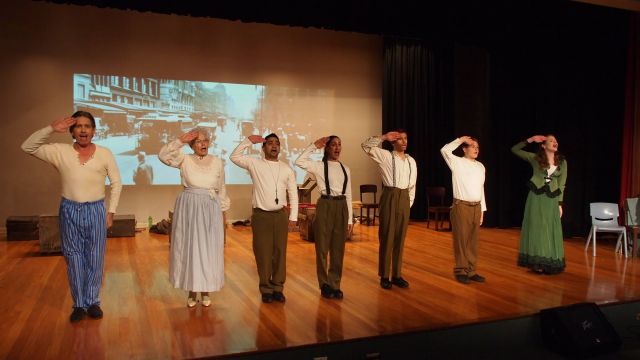Ginger Mick at Gallipoli
C. J. Dennis was credited with shaping the Anzac legend so it’s appropriate that his work forms the basis of Villanova’s Gallipoli centenary entry. Dennis’ book, The Moods of Ginger Mick, was the springboard for this piece of Australiana which incorporated his original prose, songs of the period and images from the battlefront, using a bare stage, boxes, armchair, and props. It was a little like an Australian Oh, What a Lovely War, but not nearly as effective or vivid.
On the written page Dennis was a master, but to translate the elusive charm of his prose to the stage required a better playwright than Stuart Morritt, whose adaptation was clunky. The play used two characters, Bill, the sentimental bloke, and Ginger Mick his best mate, an ensemble who played a ragtag group of parts, plus a chorus who sang songs and sometimes did an occasional dance.
Young newcomer Travis Holmes was a perfect Ginger Mick – gauche and innocent yet displaying an innate inner strength. He could also sing and sing very well indeed. His first act closer “It’s a long way to Australia, it’s a long way to home” sung to the tune of “It’s a Long Way to Tipperary” had genuine and affecting pathos. It was a portrayal of the character that resonated with a contemporary audience.

Gary McEwan as Bill was used almost as a narrator who sat stage-left in an armchair and read Mick’s letters from the front while the ensemble acted out the various scenarios with images on a screen behind the action. He brought life to the laconic Bill and was moving reading Mick’s final letter from the front.
Ensemble player Michelle Malawkin did well as a nurse, soldier and Rose, Mick’s better half, whilst chorus member Amelia Burton prettily sang Sigmund Romberg’s “Will You Remember” (“Sweetheart”) from Maytime.

Leo Bradley’s direction was rumbunctious with a drill exercise in the first half and an incongruous rap sequence in the second, pulling laughs. Accompanist Mary Greathead bashed out traditional arrangements of the tunes on a battered upright with vigour.
Dennis’ prose of the common bloke, written over 100 years ago. is almost like a foreign language these days. Words like struth, stoush and coves are rarely heard outside of a bush poetry slam, but they’re evocative and instantly delineate the Aussie vernacular of the past. When the prose of the larrikin laureate is allowed to shine through,which it does often, the stage dances with verbal fun.
Peter Pinne
Subscribe to our E-Newsletter, buy our latest print edition or find a Performing Arts book at Book Nook.

